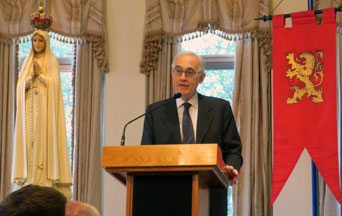 Doctrinal and moral confusion reigns more than ever in both the Catholic Church and secular society. Fortunately, 2017 will commemorate four anniversaries of important historical events that are keys to understanding this crisis: the Lutheran revolt of 1517, the founding of Masonry in 1717, the Russian Revolution of 1917, and Our Lady’s apparition at Fatima that same year.
Doctrinal and moral confusion reigns more than ever in both the Catholic Church and secular society. Fortunately, 2017 will commemorate four anniversaries of important historical events that are keys to understanding this crisis: the Lutheran revolt of 1517, the founding of Masonry in 1717, the Russian Revolution of 1917, and Our Lady’s apparition at Fatima that same year.
Such was the topic of a talk given by the Italian historian and author Roberto de Mattei on March 27, 2017. Approximately 200 clergy and laity attended the event at the Cosmos Club in the heart of Washington, D.C. Roberto de Mattei, author of more than twenty books including The Second Vatican Council: An Unwritten Story, is a respected university professor, Catholic commentator, and the director of Radici Cristiane magazine and the Corrispondenza Romana news service.
The apparitions of Our Lady at Fatima, he explained, were not only a supernatural event but an historical one. At Fatima, the Mother of God gave the world prophecies that dealt with historical and temporal events, specifically the World Wars and the Russian Revolution. Great events of history are often not entirely understood in their own time, or even many years after. Likewise, twentieth century communism can only be fully understood when put in a historical context.
Errors do not spring up from nowhere, and the errors of Russia were no different. Drawing from the thought of Plinio Corrêa de Oliveira, de Mattei demonstrated how Lenin, Trotsky, Marx, and Engels were the ideological heirs of a Revolution that extended back to the French Revolution and the Enlightenment philosophers who prepared the way for it. The Enlightenment, in turn, was the illegitimate child of the anarchist tendencies of the Protestant Revolution, particularly the Anabaptists.
 Learn All About the Prophecies of Our Lady of Good Success About Our Times
Learn All About the Prophecies of Our Lady of Good Success About Our Times
De Mattei explained how these historical revolutions were also philosophical events, with certain errors, tendencies, and mentalities common to all of them. The anarchist cries of communism, with its materialism, atheism, and evolutionism gave free reign to man’s passions, particularly pride and sensuality. Pride seeks to overthrow all hierarchies, and sensuality seeks to overthrow all moral restraints.
“Ideas have consequences,” he recalled, but like many other movements in history, this Revolution’s ideas would only be understood when it approached the final consequences of the process. The Russian Revolution, woefully misunderstood in 1917, was like an anti-Incarnation of Satan into the new twentieth century. The true breadth of the evils of Communism would only come to be understood as they devoured whole nations, cultures, and the remnants of Christian civilization over the following century.
These errors, spread by a small but radical minority, invaded the whole world like an ideological black plague. Unfortunately, anti-communists usually saw the threat of communism in terms of gulag archipelagos, tank divisions, and KGB spies. The true aim of communism, however, was not conquest or espionage but the destruction of the Christian social order, with the family at its center. The sexual revolution and its fruits—abortion, contraception, and homosexuality—was the natural consequence of communism, and indeed was foreseen, theorized, and implemented by the Left.
Most tragically, de Mattei showed how these errors have become widely accepted within the sacred walls of the Catholic Church. The Papal document Amoris Laetitia and Pope Francis’ unequivocal statements and gestures in favor of Holy Communion for divorced and “remarried” Catholics cannot be seen as a separate phenomenon, but a logical consequence of the errors of Russia. A theology of “praxis,” based on the Marxist theories of Antonio Gramsci, has replaced traditional theology based on eternal truth and Divine Revelation. Likewise, relativism and “peaceful coexistence” with erroneous doctrines and hostile political regimes is the guiding principle of Papal documents and Vatican foreign policy.
This is why the fourth of the four anniversaries, the apparitions of Our Lady of Fatima is so timely. In this centenary year of the greatest public miracle of the twentieth century, de Mattei pointed out how Our Lady is the key to understanding and persevering in this time of great crisis and confusion. She not only explained our times, but promised the triumph of her Immaculate Heart over the Revolution in our times. He concluded:
The Triumph of Mary’s Immaculate Heart, which is also the Reign of Mary announced by many privileged souls, is nothing other than the triumph in history of the natural and Christian order, preserved by the Church. Our Lady announced this triumph as the final outcome of a long trial, of tragic days of penance and struggle, but also of immense trust in Her promise.
Let us turn to Her then, in this Centenary of Her apparitions, asking Her, to make haste, this moment, making of ourselves an instrument, in our times, for Her victory against the Revolution: super Revolutionem victoria in diebus nostris, which is equivalent to saying:
In the end Her Immaculate Heart will triumph.
